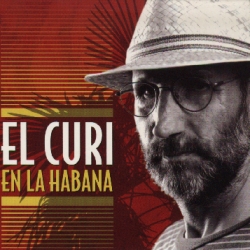
Nuevo en esta plaza, El Curi llega con trece canciones de su puño y letra, y su guitarra, en las que ofrece su muy particular visión de La Habana y sus moradores. El encuentro tantas veces soñado, hecho realidad; con sus glorias y sus miserias.
Un amor sin medida por la isla que rompe barreras y tabúes. Las andanzas de un pícaro en la República más pícara. Pícaro sí, pero pícaro enamorado.
PRENSA:
"Si un día vas por La Habana y te apetece que un español te eche un cantecito con acento local, pregunta por El Curi, un tipo singular, ibérico por los cuatro costados y a la vez que cubano, un enganchado a La Habana, a sus calles mojadas evaporándose, a la cadencia de las caderas y el olor a maní tostado. La leshe que le han dado a este tipo con su perturbador En La Habana (Nubenegra), un cócktel mestizo de verdad, para llevar a tope por una Gran Vía cualquiera hasta convertirla en Malecón..."
(Rolling Stone, abril 2001)
"El Curi en La Habana, un disco salvaje y lúcido, pop caribeño, boleros y habaneras castellanas, blues de ida y vuelta, unos músicos tremendos (los habituales de Nubenegra y el Septeto Santiaguero, ¡ahí es nada!), unas canciones mágicas, una hermosa presentación. Uno de los discos del año."
(Efe Eme, abril 2001)
"In an idiosyncratic and populary inspired overseas reading of Cuban tradition, Spanish singer, guitarist and harmonica player El Curi (Antonio Curiel) serves up an erudite tribute with En La Habana. Recorded in Madrid and backed by Cuba’s own Septeto Santiaguero, the album showcases El Curi’s wounded romanticism, rascally tenor and evocative songwritting talents. It reveals the wry, knowing gaze of aging European anti-imperialist hipster and Santeria convert reflecting upon desperate love and the inexorable contradictions of daily life on the streets of his beloved Havana (often one and the same thing). Singer, Nubenegra label mate and compatriot María salgado takes guest turns on several tracks (e.g., Como la Espuma). The influences here are multiple, from jazz, rock and blues (the harmonica-laced Malecón Blues, Tarde de Lluvia en La Habana) to the melancholy bolero-son Pendiente vivo del mar, and the Babalú-Yemayá groove of Café Habana."
(RootWorld, USA, 1 de mayo 2001)
ENGLISH:
El Curi reflects his deep affection with habaneras, boleros and blues, which carry his highly personal signature with erudite expression. For him, thingsworth mentioning happen in Havana, most of which occur in the old harbour district of this throbbing metropolis. His themes are life on the streets, where he spends most of his time, and people´s togetherness - especially his own togetherness with female people. On his album, he is also accompanied by the exceptional musicians who make up the Septeto Santiaguero, who were eager to record with El Curi from the very beginning. And also María Salgado, who shares El Curi´s passion for habaneras ( the form of song, not the women ), participates on the recording.